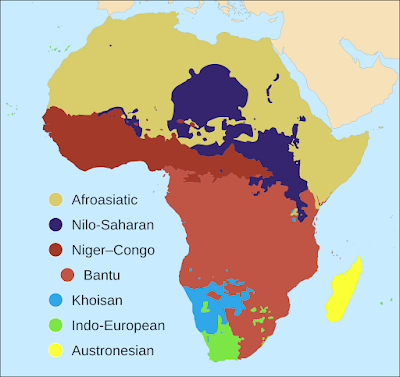Advancing Natural Language Processing Research in Africa: Challenges and Progress
 |
Map of the major language families of Africa (Courtesy: Wikimedia Commons) |
Natural language processing (NLP) is a rapidly evolving field, with applications ranging from chatbots to voice recognition systems. However, for a long time, the focus of NLP research has been primarily on widely spoken languages like English, leaving behind the rich linguistic diversity of Africa. There are many challenges faced by researchers in Africa's NLP landscape but there are also some promising initiatives that are working to bridge the gap.
The Challenge of Limited Data
One of the most significant challenges in African NLP research is the scarcity of training data for African languages. Most available data for NLP models comes from widely spoken languages, such as English, which makes it difficult to develop effective AI tools for African languages. This limited data poses a significant obstacle to progress in this field.
Linguistic Diversity Adds Complexity
Africa is home to a vast array of languages, with South Africa alone having 11 official spoken languages. This linguistic diversity adds a layer of complexity to NLP research, as each language has unique characteristics that need to be accounted for in the development of language models and tools.
The Lack of Basic Language Tools
Another challenge is the absence of essential digital language tools like dictionaries, spell checkers, and keyboards for African languages. Without these tools, content creation and communication in African languages become difficult, hindering the development and adoption of these languages in digital spaces.
Multilingual Models to the Rescue
To address these challenges, researchers are exploring the use of multilingual pre-trained language models (mPLMs). These models can understand the basic structure of related languages, even with limited training data, improving their performance in African languages. An example of such a model is SERENGETI, which covers an impressive 517 African languages and language varieties.
Progress in Uganda
In Uganda, the Makerere University Artificial Intelligence and Data Science lab is leading the way in addressing the challenges of African NLP. They are currently working on the "Building NLP Text and Speech Datasets for Low-Resourced Languages in East Africa" project. This project aims to create accessible and high-quality text and speech datasets for low-resource East African languages like Luganda, Runyankore-Rukiga, Acholi, Swahili, and Lumasaaba.
These datasets will be instrumental in training speech-to-text engines, developing AI tutors for education, and supporting people with disabilities through driving aids, among other applications. Additionally, the project will contribute to NLP tasks such as natural language classification, sentiment analysis, and machine translation, fostering the growth of NLP research in the region.
The Road Ahead
While challenges persist, Africa is making strides in NLP research and language preservation. Initiatives like the one in Uganda and efforts to digitize archival language repositories are crucial steps forward. As data becomes the new currency in AI and NLP, it's imperative that more resources are dedicated to collecting, preserving, and utilizing African languages in the digital age.
The journey to advancing NLP research in Africa is challenging, but progress is being made. With the use of multilingual models and concerted efforts to create language resources, Africa is poised to take its rightful place in the global AI and NLP landscape, celebrating and preserving its linguistic diversity along the way.

_WITH_JOURNALISTS_AT_THE_6TH_ZIONIST_CONGRESS._SEATED_NEXT_TO_HIM_IS_Z._WERNER,_EDITOR_OF_THE_ZIONIST_PAPER,_DIE_WELT._%D7%AA%D7%90%D7%95%D7%93%D7%95%D7%A8_%D7%94%D7%A8%D7%A6.jpg)
Comments
Post a Comment